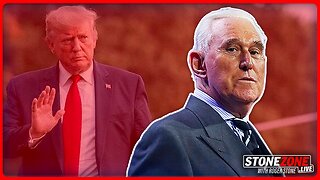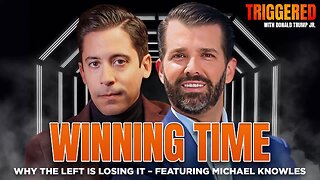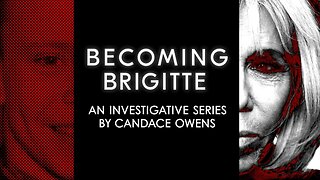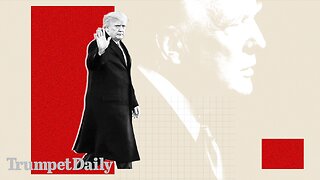Premium Only Content

The Bitcoin Dilemma: A Look at Jamie Dimon’s Controversial Statements and Corporate Actions
Introduction: A Tale of Contradictions
On September 12, Jamie Dimon, CEO of JPMorgan Chase, made headlines by publicly denouncing Bitcoin as a “fraud.” He went further, stating that he would fire any of his traders caught investing in the cryptocurrency. The result? Bitcoin’s value plummeted by 24% in the aftermath of his statement, underscoring the influence Dimon wields in the financial world.
However, revelations emerged shortly after that painted a starkly different picture. It was discovered that JPMorgan itself, alongside Morgan Stanley, was among the largest buyers of a European Bitcoin fund during that period. This apparent contradiction raises serious ethical questions about the power dynamics of influential financial institutions and their role in shaping the cryptocurrency market.
1. Jamie Dimon’s Denouncement of Bitcoin
1. The Statement Heard Around the World
• Dimon’s comments were unequivocal: Bitcoin, he claimed, was not just overhyped but fundamentally fraudulent. He compared it to speculative bubbles of the past and dismissed its long-term viability as a currency or investment.
• His warning to JPMorgan traders—threatening termination for trading Bitcoin—gave his words an air of finality and authority.
2. The Immediate Market Reaction
• Bitcoin’s price dropped sharply, losing 24% of its value within days. The reaction reflected the weight of Dimon’s words, as investors rushed to offload the cryptocurrency in response to his damning critique.
• This sharp decline highlighted the fragility of the crypto market to external influences, especially those coming from established financial leaders.
2. The Revelation: JPMorgan’s Bitcoin Purchases
1. A Contradictory Action
• Just days after Dimon’s declaration, reports surfaced that JPMorgan was among the largest buyers of a European Bitcoin fund that directly invests in physical Bitcoin.
• This revelation sparked outrage and confusion, as it appeared JPMorgan was quietly profiting from the very asset its CEO had publicly condemned.
2. Market Manipulation or Strategic Ambiguity?
• Critics argue that Dimon’s comments and JPMorgan’s subsequent actions border on market manipulation. By driving down Bitcoin’s price through public denouncement and then purchasing it at a lower value, the firm may have reaped significant financial benefits.
• Others contend that Dimon’s personal views may not reflect the broader strategy of JPMorgan, though the timing of these events makes this defense difficult to accept at face value.
3. Ethical Implications in the Financial Sector
1. The Power of Influence
• Dimon’s comments demonstrate the outsized influence that major financial players have over markets, particularly volatile ones like cryptocurrency.
• When such influence is wielded in a way that appears contradictory or self-serving, it erodes public trust in the integrity of financial institutions.
2. The Double Standard
• The apparent hypocrisy of JPMorgan’s actions underscores a troubling double standard: established financial institutions can criticize, manipulate, and profit from emerging markets in ways that individual investors cannot.
• This raises questions about whether large firms are playing by a different set of rules, using their influence to create opportunities for profit at the expense of smaller investors.
3. Transparency and Accountability
• In an era where public trust in financial institutions is already precarious, incidents like this highlight the need for greater transparency and accountability.
• Regulators may need to scrutinize such actions more closely to ensure that firms are not exploiting their market power in ways that undermine fairness and integrity.
4. The Broader Context: Cryptocurrency and Traditional Finance
1. The Threat of Decentralization
• Bitcoin and other cryptocurrencies represent a challenge to traditional financial systems. By decentralizing currency and removing the need for intermediaries like banks, they threaten the established order of finance.
• Dimon’s critique can be seen as part of a broader skepticism from traditional finance toward cryptocurrency, fueled by its disruptive potential.
2. Adoption Despite Criticism
• Despite public criticism, many traditional financial institutions are quietly adopting cryptocurrency technologies or integrating them into their offerings.
• JPMorgan itself has developed its own cryptocurrency, JPM Coin, highlighting the nuanced relationship between traditional finance and the emerging crypto economy.
3. The Need for Ethical Leadership
• As cryptocurrency continues to grow in prominence, the actions of major players like JPMorgan will shape its future. Ethical leadership is crucial to ensuring that this growth is not undermined by manipulative or exploitative practices.
5. Lessons for Investors and Regulators
1. Beware of Market Influences
• Investors must recognize the power dynamics at play in markets, particularly in emerging sectors like cryptocurrency. Public statements from influential figures often serve strategic purposes and should be analyzed critically.
2. The Role of Regulation
• Regulatory bodies need to address the potential for market manipulation, ensuring a level playing field for all participants. This includes scrutinizing the actions of major institutions and holding them accountable for any unethical behavior.
3. Transparency in a New Era
• As finance evolves with the rise of cryptocurrencies, transparency will be key to maintaining trust. Institutions must align their public statements with their actions, fostering credibility in a rapidly changing landscape.
Conclusion: A Call for Integrity in the Financial World
The events surrounding Jamie Dimon’s comments on Bitcoin and JPMorgan’s subsequent actions serve as a stark reminder of the power and responsibility that comes with influence. While cryptocurrency remains a volatile and polarizing market, its growth reflects a desire for change in how we think about money, value, and trust.
For traditional financial institutions, navigating this new era requires more than just strategic adaptation—it demands ethical leadership. By aligning their words with their actions and prioritizing transparency, these institutions can play a constructive role in shaping the future of finance. For investors, regulators, and the public, the lesson is clear: stay vigilant, question the narrative, and demand accountability from those who wield the greatest influence.
-
 15:22
15:22
FragmentsOfTruth
1 day agoBanned from Talking to Dolphins? The Strange Government Law That Raises More Questions
194 -
 58:00
58:00
The StoneZONE with Roger Stone
8 hours agoEuropean Leaders Resist Trump Peace Overtures To Their Own Demise | The StoneZONE w/ Roger Stone
73.3K12 -
 9:29
9:29
AlaskanBallistics
9 hours ago $7.25 earnedWyoming Suppressors and Rifles at Shot Show 2025
82.6K4 -
 1:06:40
1:06:40
Donald Trump Jr.
13 hours agoThe Left is Taking one L After Another, Live with Michael Knowles | Triggered Ep. 217
175K113 -
 47:17
47:17
Kimberly Guilfoyle
13 hours agoWoke Gets DOGE’d, Live with AJ Rice & Jarrett Stepman | Ep. 197
129K43 -
 20:11
20:11
Candace Show Podcast
12 hours agoBecoming Brigitte: Candace Owens x Xavier Poussard | Ep 6
193K330 -
 8:25:38
8:25:38
Dr Disrespect
16 hours ago🔴LIVE - DR DISRESPECT - ELDEN RING DLC - REVENGE
194K22 -
 54:22
54:22
LFA TV
1 day agoThe End of the Trans-Atlantic Alliance | TRUMPET DAILY 2.17.25 7PM
50.2K7 -
 55:56
55:56
BIG NEM
15 hours agoUGLY COCO: The Rapper Who’s Tried EVERY PSYCHEDELIC 🌌
22.6K1 -
 1:42:51
1:42:51
2 MIKES LIVE
13 hours ago2 MIKES LIVE #181 Deep Dive Monday!
26.8K3